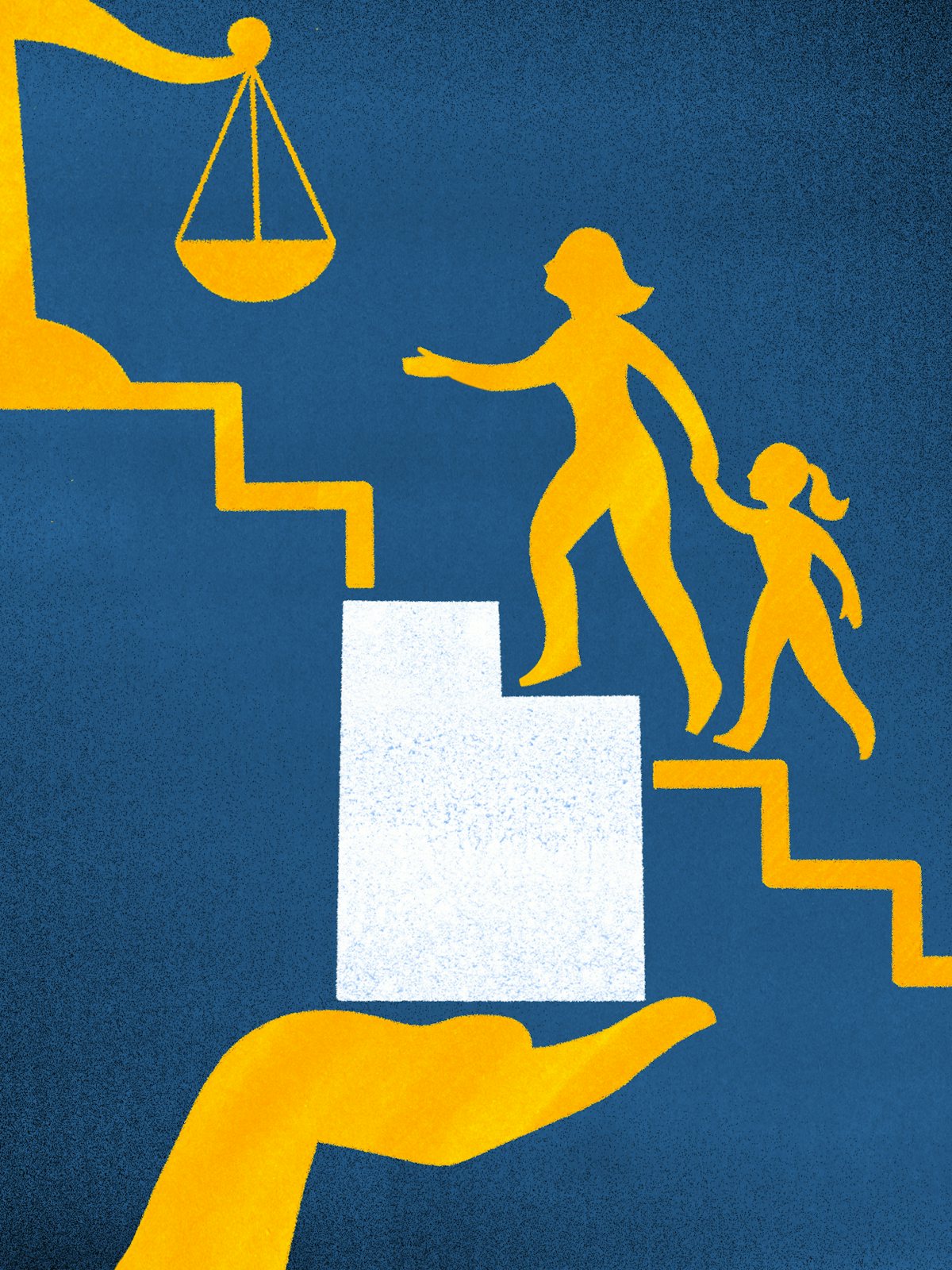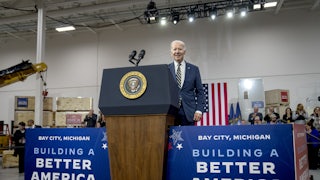Amber Alleman was in fifth grade when her parents got divorced. The couple had been together for 20 years when Alleman’s dad decided to leave.* He hired a lawyer and kicked Alleman’s mother out of the house. Her mom was a stay-at-home parent, and her dad had all the financial resources. When he initially refused to pay child support, her mother went on welfare. Alleman remembered watching her mom struggle to afford legal help. “This is not right,” Alleman told me she’d thought. “Why does he get to control everything?”
Years later, Alleman began a career as a paralegal, focusing on family law. She wanted to help people like her mom—but she quickly found that the standard hourly rate was astronomical at the firms in Salt Lake City where she worked. Alleman’s boss, a successful family law attorney, charged clients $400 per hour. “I would tell people her hourly rate just for a consultation,” Alleman said. “I could almost hear them fainting on the phone.”
Then Alleman’s boss told her about a pilot program in Utah where paralegals could, on a limited basis, offer services directly to clients. In June 2019, she began a two-month training program to become a licensed paralegal practitioner, or LPP, a new designation that lets experienced paralegals consult with clients, investigate cases, file documents, and attend mediations—nearly everything short of representing someone in court. That September, she became one of the first four paralegals in Utah to receive an LPP license.
Almost every state in the United States makes it illegal for a nonlawyer to offer direct legal advice, a regulation dubbed the unauthorized practice of law, or UPL. But as the number of people who can’t afford to hire attorneys in civil cases reaches a crisis point, advocates are pushing for a major reform to UPL laws—one that would make room for new classes of legal professionals, such as paralegal practitioners like Alleman, who can offer lower-cost help to people struggling to navigate the legal system.
Utah and Arizona are currently the only states in the country that are licensing, on a widespread basis, new paralegals to practice law, but a number of states, including Minnesota, New Mexico, Colorado, and Oregon, are in various stages of implementing similar programs. Minnesota, for instance, is currently running a limited pilot program set to end in 2023. While these programs go by different names and include different requirements, they have a few things in common: They generally restrict eligibility only to the most experienced paralegals, and focus on family law, landlord-tenant disputes, and debt-collection cases. This could also empower people who graduated from law school but never passed the bar exam—roughly 10 percent of all law school graduates.
“The tenor of the legal profession is changing,” said Alicia Mitchell-Mercer, a co-founder of the North Carolina Justice for All Project, which has been pushing that state to adopt rules similar to Utah’s. “Especially with Covid, you have this crisis of evictions that you can’t possibly deal with without bringing in some other players.”
Attorneys are incredibly expensive. The average lawyer serving individual clients (as opposed to one serving corporations) costs between $270 and $300 per hour, according to an estimate from the legal scholar Gillian K. Hadfield. The end result is that most litigants in civil court navigate the legal system on their own, often while facing off against well-resourced landlord companies or debt-collection agencies. A survey in one Utah court district found that, in 93 percent of civil and family-law cases, at least one litigant didn’t have a lawyer. In New York City, an astonishing 92 percent of tenants faced eviction court without a lawyer, despite the city’s right-to-counsel law.
Paralegals “generally talk to clients much more than attorneys do,” Robert E. Mongue, a retired professor of legal studies at the University of Mississippi, told me. “Part of the thinking here was, OK, you have legal services helping the poor, you have pro bono attorneys helping the poor. You have a whole lot of attorneys helping the rich. What about those people in between?”
In the days of Colonial America, lawyers were regarded with intense skepticism. Rather than arbiters of public disputes, they were seen as rabble-rousers who had a financial interest in escalating arguments. For instance, the Colony of Connecticut complained in 1729 that “many persons of late have taken upon them to be attourneys at the bar, so that quarrels and lawsuits are multiplied.”
Branding them “pettifoggers,” Colonial-era politicians passed laws instituting quotas on the number of lawyers who could practice in a given region. In 1641, Massachusetts banned lawyers from receiving any fees for representing a client in court. Modern regulations didn’t appear until the turn of the twentieth century, when a crop of newly formed bar associations obsessed over a new problem: Too many poorly trained people, they believed, were holding themselves up as lawyers. In 1898, New York passed one of the first UPL statutes, which largely mirrored the ones on the books today. By the middle of the twentieth century, nearly every state had a UPL rule.
“The profession was trying to increase its standing in the eyes of the public,” Laurel Rigertas, a law professor who has researched the history of UPL laws, told me. “They’re pretty explicit about wanting to protect both the public from unqualified practitioners and to protect the legal profession’s reputation from being sullied by unqualified practitioners.”
Limiting the practice of law only to licensed lawyers probably made sense at the time, given that lawyers were largely solo practitioners. While some offices employed legal assistants, the creation of a professional class of paralegals didn’t begin until the 1960s, as legal work became increasingly complex.
Today, legal services are an outlier in terms of how tightly they are licensed. In the medical field, for instance, both doctors and nurse practitioners can see their own patients in most states. While nurse practitioners don’t have all the powers of doctors, they can prescribe treatments, order lab tests, and diagnose diseases. Or take accounting—certified public accountants have more powers than professional accountants without a certification, but both can help prepare taxes.
The extent to which UPL laws have inflated lawyer pay is difficult to untangle. For as much as they charge per hour, many attorneys who represent individuals don’t turn significant profits. Law firms that serve corporations—property management companies trying to evict tenants, for instance—are the real cash cow. But some of the backlash to paralegal practitioners certainly has echoes of financial protectionism. Washington state, for instance, started the country’s first program for paralegals and other legal technicians in 2012 but paused it in 2020, after backlash from the state bar association. According to one lawyer who sat on the bar association board, his colleagues killed the program for fear that “their market share [would] be eroded” with the influx of paralegal practitioners.
In 2020, her first full year as a paralegal practitioner, Alleman took on 20 of her own clients, charging $75 per hour. Many worked two or three jobs, often delivering food or cleaning offices. She helped in little ways. For child-support cases, few of her clients realized that their income should not be counted beyond one full-time job. When she attended mediations alongside them, she interceded to ensure they weren’t taken advantage of.
Paralegal practitioner programs are still too small to have a real impact on broadening access to legal advice. Since Alleman’s initial class of four paralegals in 2019, only 22 more have joined their ranks in Utah. While some of these paralegals offer legal services independently, many still represent clients under the umbrella of a larger law firm, where they spend their time balancing their own clients against existing paralegal work. Tonya Wright, a Utah paralegal who received her LPP license in 2020, told me her clients occupy about 10 percent of her workload. The rest of her time goes toward helping her boss at the law firm where she works.
But many paralegals are seeing the need for their lower-cost services firsthand. Wright said that she gets at least one call a day from people who are overwhelmed by the documents they need to fill out in order to get a divorce or fight an eviction. “I had one [client] who literally had stayed married for an excess of 13 years to somebody she has not seen or spoken to in over a decade,” Wright said, “because she just didn’t know how to do it and couldn’t afford it.”
But, most often, people just need someone to go with them to a mediation to settle a divorce or a debt-collection case. “Especially if the other side has an attorney, you’re picturing yourself at mediation alone, and the other side’s there,” Wright said. “That could be pretty scary. So [they want] somebody there to make sure that they’re not getting steamrolled.”
If the ultimate goal of paralegal practitioner programs is to make legal services affordable to the working class, their record so far is mixed. One survey found that Washington paralegal practitioners charged a median of $100 per hour. Under Minnesota’s pilot program, 20 percent of paralegal practitioners charge between $50 and $100 per hour, while 40 percent charge between $150 and $200. These rates, while significantly cheaper than a typical lawyer’s fee, are still out of reach for most lower–middle-class people.
Paralegal practitioner programs are a moderate reform, blunting—without actually rolling back—the fundamental injustice of the legal system: Wealthy plaintiffs can easily outspend poorer defendants. More than half of all civil cases involve corporations suing individuals, most prominently in debt-collection or eviction cases. The ability of corporations to hire expensive lawyers means they almost always win.
These new programs are also struggling to find institutional support. After the initial surge of clients in 2020, Alleman’s requests from new clients have petered out. She isn’t seeing the bar association advertise the LPP program anymore, which means that, three years in, few people in Utah seem to realize this affordable alternative even exists. “I wish I could do it as my full-time job,” she said. “But the clientele just is not there at this point.”
* This article originally misstated the number of years Alleman’s parents were together.






